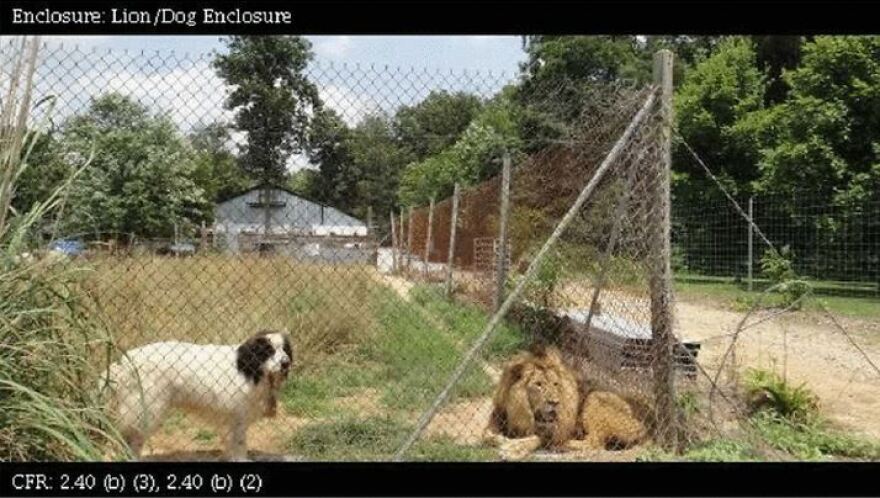A troubled Louisville-area wildlife exhibit with a history of unsafe conditions for animals is the subject of another critical U.S. Department of Agriculture inspection, though consequences for the federal violations remain unclear.
The USDA’s most recent inspection of Wildlife In Need of Charlestown, Indiana, found dangerous shelters, animal deaths, inadequate care and a host of other issues, including a hostile owner.
Wildlife In Need, a nonprofit that runs a popular tiger petting zoo among other events, was the subject of a 2014 series by the Kentucky Center for Investigative Reporting. The stories revealed the group’s troubling record, underscored lax state and federal oversight and raised questions about public safety issues.
The most recent violations are the latest in a lengthy battle between the Southern Indiana roadside zoo and the feds.
The last inspection, in January, started as a routine matter. Officials sought documents, but claimed owner Tim Stark became hostile, refused to hand over documents, and inspectors believed “the situation could possibly become unsafe.” They left without finishing their inquiry.
Reached Friday, Stark said he is completely in compliance with USDA regulations. He said investigators falsified the report, and said he plans to file suit against the federal agency.
“I am not doing nothing wrong here,” Stark said. “I have entertained hundreds and hundreds and hundreds of thousands of people. I take care of my animals, we love our animals here.”
Stark, who previously told KyCIR he did not need to follow laws he did not agree with, said the federal agency has a vendetta against him. (Read KyCIR's coverage of Wildlife In Need)
The recent report highlighted the deaths of four animals: a kangaroo, an adult otter and two baby otters. Investigators said Stark failed to call a veterinarian, or provide adequate medical care, when the animals fell ill.
The report noted Stark never got necropsies for the animals, though inspectors previously told him that unexplained deaths require necropsies.
Inspectors also determined a tiger enclosure was deficient, too short to ensure the tigers can’t escape. Meanwhile, an adult lion and a dog continue to share a pen. Each slept on the snow-covered ground or dirt floor, inspectors found.
Nails protruded at eye level in a pen for a coyote and coydog. Also, inspectors discovered a Brown bear, Chloe, who appeared to be injured and bleeding from its elbow during the inspection.
Stark said the bear was not injured, and inspectors refused to come examine the bear when he told them it was not bleeding.
KyCIR reported on several of these same findings two years ago. Since then, Indiana legislators shot down a bill that would have required exhibitors and dealers of dangerous animals to apply for a state license and undergo more inspections.
Stark has been cited with 13 repeat compliance violations since August 2014. The violations come with recommendations, however, not fines or legal ramifications.
USDA spokeswoman Tanya Espinosa said the agency has an open investigation into Wildlife in Need, though she declined to provide details. Owners cannot be fined until the USDA completes an investigation, even if they are repeatedly in non-compliance.
In February, the USDA filed an appeal in a federal administrative court following an earlier judge’s ruling against the agency in its attempt to revoke Stark’s license. In January, the USDA argued in federal court that Stark violated the Endangered Species Act in 2004 during the transfer of an ocelot. Thus, Stark was unfit to hold an animal exhibitor license under the Animal Welfare Act, the feds argued.
Wildlife in Need is home to a vast collection of exotic animals, but is probably best known for its 15 tigers. The “Tiger Baby Playtime” exhibit allows adults and children to play with baby tigers. The event was previously cited by the USDA because the tigers were too large and possibly dangerous for children.
Earlier this week, People For Ethical Treatment of Animals publicized the USDA’s inspection report and harshly criticized Stark and his organization.
“When it seemed the situation couldn’t get any worse, the inspection report showed that it’s more of the same,” said Jenni James, an attorney for PETA. “Basically he treats animals like they’re disposable. Enough is enough, the USDA needs to shut down this hell-hole for good.”
A former Wildlife In Need employee and several volunteers have also expressed criticism and concerns.
Will Wright, KyCIR's summer fellow, can be reached at wwright@kycir.org and (724) 344.6945.







